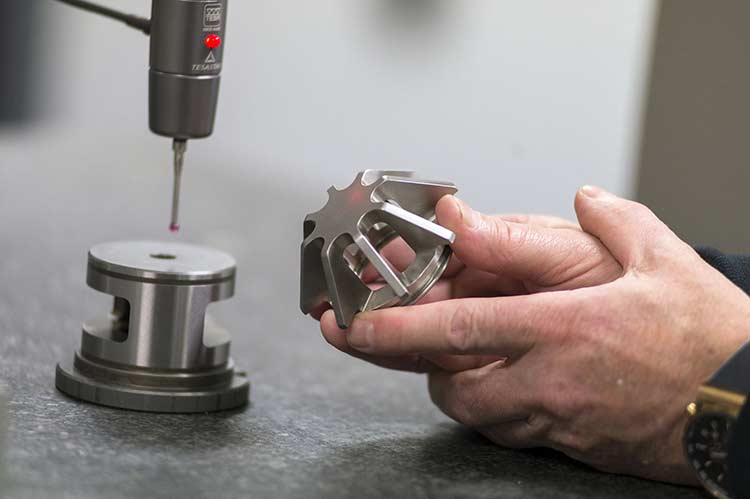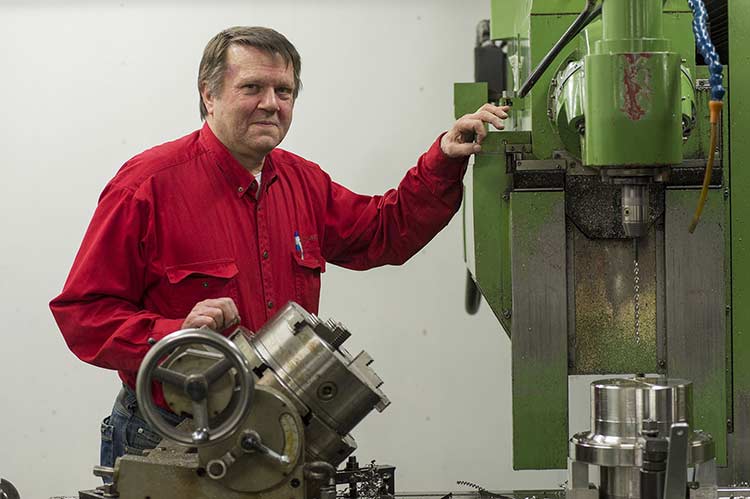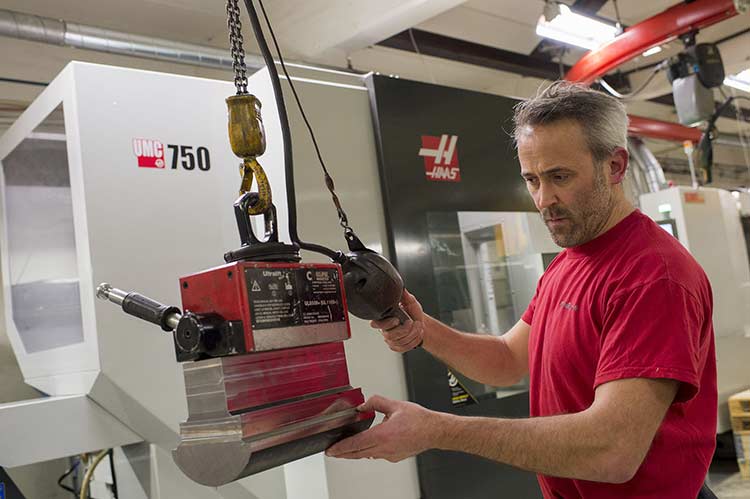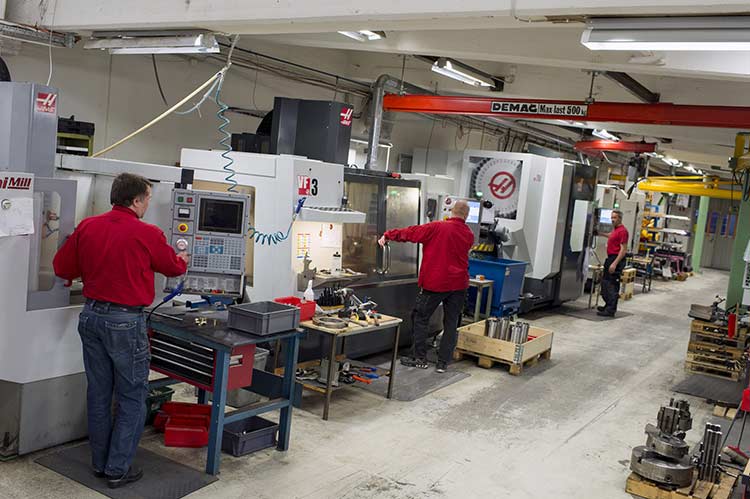In one of the developed world’s most expensive countries, a small engineering shop is surviving, prospering and growing by investing wisely in reliable, high-performance and affordable Haas CNC machine tools to cut complex parts in hard materials.
Telgelego is a precision machining subcontractor based around 40km south of Stockholm, Sweden. The company is located in a backstreet yard on an industrial estate surrounded on all sides by the offices and workshops of Scania, builder of trucks, buses and engines, one of the country’s best-known manufacturing companies.

Tomas Karlsson owns the company and although it was founded in 1978, it didn’t come into his possession until 8-years ago, when he bought it from the original owners. At that time, he and his brother already ran another, similarly sized subcontract business nearby. Ambitious and looking for new opportunities, purchasing Telgelego brought the brothers fresh contacts and new horizons.
Telgelego has a shop full of old-style lathes and knee type milling machines and just two employees. One of the machines that came with the purchase of the company was a 2001 Haas CNC MiniMill. Despite the small workforce, and the preponderance of ageing equipment, customers included big-name companies such as Alfa Laval and Astra Zeneca, as well as ubiquitous Scania.
These days, Telgelego has 7 Haas CNC machine tools, including an SL-30 lathe and an SL-40 lathe, an ST-30Y y-axis lathe, the original MiniMill and, the company’s latest investment, a UMC-750 universal machining centre.
Equipped with everything it needs to service its demanding, blue chip customer base, strategy is to offer high-quality, low volume subcontract machining services, specialising in precision parts in stainless steel, tool steel and, occasionally, titanium. As well as creating parts for mainstay clients, other short-run jobs are made for the paper and pulp industry, as well as shipping and marine engineering. Cutting tough materials has become the company’s USP: many parts are hardened and ground to finish.
“Our other biggest strength is the complexity of the parts we can machine,” says Mr. Karlsson. “The customer sends us the main drawing for a part and we make additional drawings, to simplify manufacturing. Occasionally, we reverse engineer parts, if they’re spare or replacement components for a machine, for example.”

A typical part for Alfa Laval, which Telgelego is contractually required to keep under wraps, requires 32 hours of machining – 16hrs each side. The company usually makes 20-25 of these parts each year. “In the course of a typical 12-months we machine Kr1.5 million worth of stainless steel,” says Mr. Karlsson. “Most of the jobs are very small runs. One customer orders 2-300 of one particular part every month, but that’s unusual.
“Many of the parts we make are large diameter – typically around 400-500mm. The Haas lathes are excellent, high torque machines perfectly suited to cutting these large diameter stainless billets. The two-speed gearbox on the SL-30 is very useful. We take big rouging cuts and make a lot of chips.
“We bought the SL-40 to replace a large German-built lathe which was always letting us down. One of the parts we now machine on the Haas for Alfa Laval starts as a 500kg, 420mm diameter billet and ends-up as a 90kg part!” Although the company does a lot of roughing, it also machines parts to tight tolerances. “For example,” points out Mr. Karlsson, “it’s common we machine bearing housings to 0.0027mm.
“As well as our expertise in hard materials and complex parts, customers often use us because of the speed with which we can turn a job. For example, before a Scania part goes in to production, we’ll make 2-3 examples for development and testing. The customer isn’t set-up for this type of machining, but once they have finalised the design of the part, they can tool-up their own machines and make them in-house. Being close to their shop also helps keep delivery short.”

The company invested in the Haas ST-30Y to machine more complex, turned and milled parts in fewer set-ups.
“We bought the ST-30Y when we had an employee who had good experience with y-axis milling. Unfortunately, he left the company a little while later, which left us with a skills shortage. It’s very difficult in Sweden to find qualified machinists. We had a deadline for the work on the machine at that time so we had to learn how to operate it very quickly. Thankfully, everyone in the workshop is familiar with the Haas control, so it was relatively easy to move someone to the ST-30Y and get them comfortable.”
The employee who left eventually came back. “We bought him a Haas VF-2 with a Haas rotary table 4th axis, which is now his responsibility.”

After the arrival of the VF-2, the company also bought a Haas VF-3 to replace an ageing Taiwanese machine. “For 3-years this machine was dedicated to making a single part until the customer moved the job to a subcontractor in China. As it turned out, the machine was freed up to provide capacity we were desperate for, so things worked out just fine.”
The company buys all of its Haas CNC machine tools from Jönköping-based Edströms Maskin AB, one of the world’s most successful Haas Factory Outlets (HFOs). Like all HFOs, Edströms employs trained and factory certified technicians, runs a fleet of fully-stocked service vans and keeps an inventory of original Haas spare parts worth millions of dollars. As a result, Edströms can respond to problems and technical issues without delay, resolving even the most serious of events without having to send for parts or engineers from the USA.
“We had a terrible accident with the SL-40,” remembers Mr. Karlsson. “We dropped a 250Kg part while it was being machined. It did a huge amount of damage but Edströms did an amazing job repairing the damage – the guideways, the chuck, the guards, etc. They had it completely fixed and running again in less than 2 weeks. It was as good as new!”
As Telgelego grows, as does its reputation for machining complex parts in hard materials, the company is committed to investing in the best, affordable CNC technology it can find. Fortuitously, around the time Mr. Karlsson and his colleagues began thinking about a five axis, universal machine, Haas launched its UMC-750.

“Ours was the first UMC-750 installed in Sweden. We placed an order as soon as we knew it was going to be available because we found we had more and more work that could be
done better and quicker on a universal type machine. We looked at what we could buy from other manufacturers for the same money and they had smaller tables and smaller work-envelopes. To be honest, so far we’re not doing full five-axis cutting – we haven’t yet made the investment in the 5-axis Edgecam software. But, as a 3+2 machine cutting stainless and tool steel, it’s doing a great job. It’s currently making a large cylindrical part – a roller for steel production. We have great expectations for this machine.”
Lots of similarly sized businesses in Sweden are finding it very difficult or impossible to survive. Often, the problem is simply finding suitably qualified people to run and manage them as owners grow older and retire. There are few, young successors willing to enter manufacturing. It’s a problem common to almost all industrialised nations.
“The longer Telgelego stays in business, the better,” says Mr. Karlsson. “As other companies fall away, we’re well placed to benefit. We have a big order coming next year so we need more space and we have to find another 2-3 employees. We’re expecting to move premises in 2015. We’re also hoping to invest in some bigger Haas vertical mills; bigger and more complex parts are the future for us.
“These are uncertain times, but increasingly, we have enough work that every machine in the shop is busy. Every day is a challenge, but those are definitely the days I feel happiest!”


